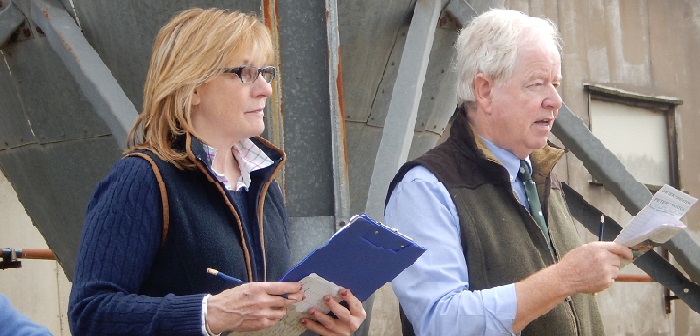In Wimbledon terms, it was a case of “advantage pig sellers” due to a very slight improvement in the value of the euro and tighter UK pig supplies, but no significant price rises, just a slightly more positive feeling to the trade.
The SPP eased back by 0.15p to 132.63p/kg and most spot deals were at positive stand-on levels within the 131p-133p range, although one or two fresh meat wholesalers who were looking for lighter weights were prepared to up their bids a touch with quotes in the 140p/kg region.
As mentioned, despite the financial crisis in Greece, euro traders seem to have allowed for this, with the result that the currency traded on Friday worth 72.07p compared with 71.11p a week earlier, which effectively puts up the cost of imports by 1.4% and increases the value of our cull sow and other pigmeat exports by a similar amount.
Despite this, cull sow prices have generally remained at stand-on levels with further reports of overflowing cold stores, partly due to the Russian embargo on imported EU produce that looks set to be extended for another 12 months or possibly longer. As a result, cull sow prices remain in the doldrums in the 50p-53p range, that represents almost half their value a year ago.
Weaner prices continue to suffer from the ongoing lack of confidence in finished pig and feed prices in the months ahead as well as recent rises in cereal futures prices, with the latest AHDB 30kg ex-farm average standing at £43.51 and 7kg weaners at £32.76.
As previously mentioned, independent weaner buyers could do a lot worse than filling up some empty pens now rather than being involved in carting bales, which could be done by a lad in the village at the new ‘national living wage’ announced by the Chancellor in his summer budget of £7.20 an hour. There’s more to be made (or lost) buying and finishing pigs than there is carting straw.
Feed prices ended another variable week with November feed wheat quoted on the LIFFE futures market at £131.50/t and March 2016 at £133.85/t. With mixed reports emerging from the cereal market, it’s hard to pinpoint which way prices are going, but it was good to hear that French soft wheat output is estimated to be higher than last year despite the recent hot weather, and that GB barley production could remain at high levels.
Wheat prices, which provide the benchmark for the whole compound feed cost basis, moved up last week to the highest level seen since January, but reports are emerging that the recent spell of dry weather in the EU may have come too late to have a massive impact on wheat yields, but dry conditions in Canada and wet weather in parts of the US are adding concern over the quality and exportability of winter wheat. Once again, this may be a time for UK pig producers to continue taking little bits of cover, but not all at once.
And finally, it’s good to hear that the NPA is making progress in making PEDv a notifiable disease in England because it’s definitely a killer both in financial and physical terms and has to be treated with the utmost respect, especially bearing in mind that Defra has made it clear that compensation levels for notifiable disease slaughter and consequential losses will be under the spotlight. The industry may have to take on board a significant proportion of losses rather than looking to Brussels for financial restitution, which could mean the ruination and bankruptcy of affected UK pig farmers and allied trades.




